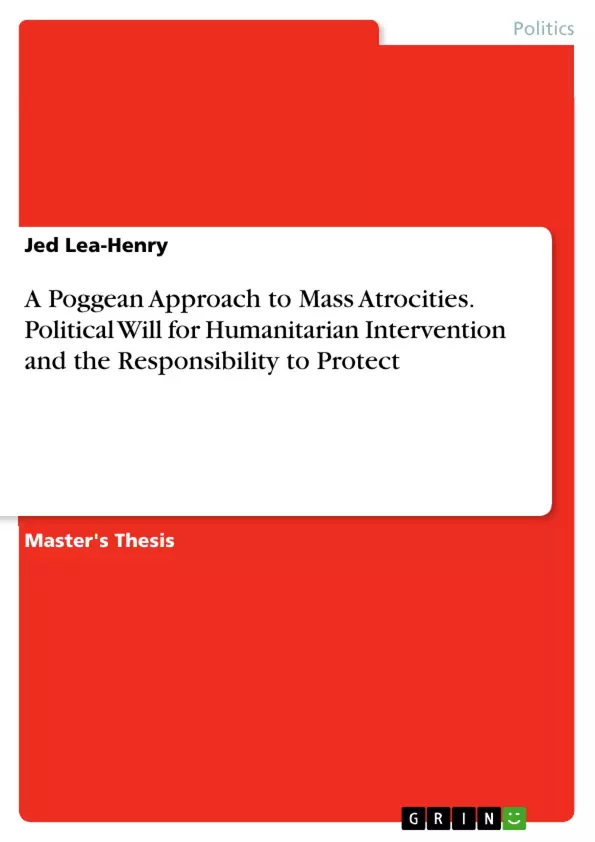
A Poggean Approach to Mass Atrocities. Political Will for Humanitarian Intervention and the Responsibility to Protect
Masterarbeit, 2014
61 Seiten
Leseprobe
Frequently asked questions
What is the central argument of 'A Poggean Approach to Mass Atrocities: Addressing Indeterminacy and Failures of Political Will for Humanitarian Intervention and the Responsibility to Protect'?
The central argument is that humanitarian intervention and R2P are hindered by a lack of political will. Overcoming this requires a two-stage approach: developing a stronger moral imperative, drawing from cosmopolitanism and Pogge's negative duties, and implementing a feasible reform agenda to lower political/material barriers.
What are the objectives of this language preview?
This language preview aims to provide a comprehensive overview of the document, including the title, table of contents, objectives and key themes, chapter summaries, and keywords.
What are the key themes explored in the preview?
The key themes include humanitarian intervention, the Responsibility to Protect (R2P), political will, moral cosmopolitanism, Thomas Pogge's theories on justice and negative duties, global justice, and feasible reform agendas for international relations.
What does Chapter 1 discuss?
Chapter 1 addresses the failure of political will in humanitarian intervention and the Responsibility to Protect (R2P). It covers humanitarian intervention, sovereignty, empirical failures in the 1990s, the development of R2P, the failure of R2P, and the concept of political will.
What are the core aspects of Moral Cosmopolitanism discussed in Chapter 2?
Chapter 2 discusses Moral Cosmopolitanism, Thomas Pogge, and the Development of Moral Force through Negative Duties. Key aspects of moral cosmopolitanism include Individualism (individual as core moral concern), Universality/all-inclusiveness (equal moral worth), Generality of concern (global scope), and challenges of state-based moral dissemination.
How does Thomas Pogge's philosophy relate to the issues of mass atrocities?
The preview outlines how Pogge's theories, especially his emphasis on negative duties (duties not to harm) and institutional cosmopolitanism, can be applied to understand and address mass atrocities as violations of these duties.
What feasible reform agendas are considered in Chapter 3?
Chapter 3 explores feasible reform agendas, including Intervention Agreements, Democratic Panels, Democratic Funds, the expansion of these panels, Global Resources Dividend, Ecological Tax, alternative development aid models, Health Impact Fund, Media Development, UN Reforms such as Jurying Process and the International Court, as well as a UN Standing Army and regional annexations of Humanitarian Intervention.
What is a 'Democratic Panel' as envisioned in the reform agenda?
A 'Democratic Panel' is a credible external authority comprising international lawyers. These act as a mediator to deliver discretionary judgements and ensure constitutionality is upheld by international and regional organizations.
What does the Glossary include?
The Glossary provides acronyms and initialisms. It includes common abbreviations used in international relations, such as ASF, AU, CAR, CNPC, DRC, ECOWAS, FDI, G77, GDP, ICC, ICISS, ICJ, IMF, NATO, NGO, OAU, P5, R2REACT, R2REBUILD, R2P, R2PREVENT, TRIPS, UN, UNGA, UNSC, and WTO.
What are the key concepts in Pogge's approach related to preventing harm?
Key concepts include differentiating between negative duties (duties not to harm) and positive duties (duties to assist); also understanding harms through interactional harm (profiting, state-behaviour) and through institutional incentives and cosmopolitanism.
What is the Health Impact Fund and how does it relate to development policy?
The Health Impact Fund is a proposed funding mechanism to incentivize pharmaceutical companies to develop medicines for diseases prevalent in developing countries. It promises more affordable medical costs which would boost long-term development.
Details
- Titel
- A Poggean Approach to Mass Atrocities. Political Will for Humanitarian Intervention and the Responsibility to Protect
- Hochschule
- Deakin University
- Autor
- Jed Lea-Henry (Autor:in)
- Erscheinungsjahr
- 2014
- Seiten
- 61
- Katalognummer
- V385829
- ISBN (eBook)
- 9783668618091
- ISBN (Buch)
- 9783668618107
- Dateigröße
- 960 KB
- Sprache
- Englisch
- Schlagworte
- poggean approach mass atrocities political will humanitarian intervention responsibility protect r2p Thomas pogge Humanitarian intervention moral responsiblity
- Produktsicherheit
- GRIN Publishing GmbH
- Preis (Ebook)
- US$ 0,99
- Preis (Book)
- US$ 44,99
- Arbeit zitieren
- Jed Lea-Henry (Autor:in), 2014, A Poggean Approach to Mass Atrocities. Political Will for Humanitarian Intervention and the Responsibility to Protect, München, Page::Imprint:: GRINVerlagOHG, https://www.diplomarbeiten24.de/document/385829
- Autor werden
- Ihre Optionen
- Vertriebskanäle
- Premium Services
- Autorenprofil
- Textarten und Formate
- Services für Verlage, Hochschulen, Unternehmen

- © GRIN Publishing GmbH.
- Alle Inhalte urheberrechtlich geschützt. Kopieren und verbreiten untersagt.
- info@grin.com
- AGB
- Open Publishing
Der GRIN Verlag hat sich seit 1998 auf die Veröffentlichung akademischer eBooks und Bücher spezialisiert. Der GRIN Verlag steht damit als erstes Unternehmen für User Generated Quality Content. Die Verlagsseiten GRIN.com, Hausarbeiten.de und Diplomarbeiten24 bieten für Hochschullehrer, Absolventen und Studenten die ideale Plattform, wissenschaftliche Texte wie Hausarbeiten, Referate, Bachelorarbeiten, Masterarbeiten, Diplomarbeiten, Dissertationen und wissenschaftliche Aufsätze einem breiten Publikum zu präsentieren.
Kostenfreie Veröffentlichung: Hausarbeit, Bachelorarbeit, Diplomarbeit, Dissertation, Masterarbeit, Interpretation oder Referat jetzt veröffentlichen!
- GRIN Verlag GmbH
-
- Nymphenburger Str. 86
- 80636
- Munich, Deutschland
- +49 89-550559-0
- +49 89-550559-10
- info@grin.com
-









